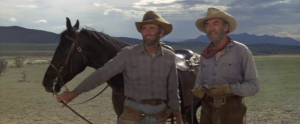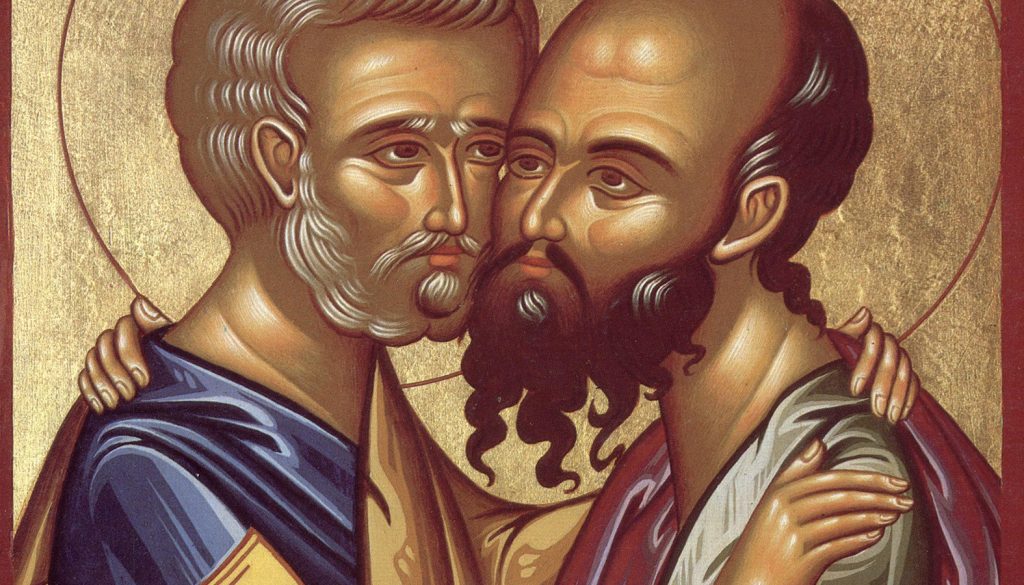The tumult of our recent past has left a lot of collateral damage in its wake. Myriad features on local and national news have covered how family gatherings in the so-called “post-COVID” era are strained due to vehement disagreement on economic, political, and even religious issues are as predictable as a lunar eclipse.
We may personally have experienced such tense exchanges where harsh feelings and harsher words are fired back and forth at family gatherings, sometimes with only a bowl of mash potatoes keeping some from coming to blows. Sadly, this “us against them” or “me against you” mentality has seeped through the cracks in a lot of church doors as well. At a time when we need friends the most, friendship is at greatest risk.
Imagine if our new standard of friendship boundaries existed in the past. Things might have turned out a lot differently. St. Peter and St. Paul were very different people; St. Peter a simple fisherman under the yoke of imperial Rome just trying to make a living and St. Paul, or Saul of Tarsus then, a Roman citizen and a Pharisee. Even immediately after St. Peter took the helm after the Ascension, Saul of Tarsus violently persecuted Christians. Their differences did not end after St. Paul’s conversion, but they never threatened their friendship.
Friendship today now has so many transactional elements to it. A friendship can be damaged beyond repair if words are not checked carefully before spoken. It wasn’t always this fragile. Some of the most profound friendships in history were forged between people who had very little in common. Some of these friendships even survived two people holding polar opposite views on very important issues.
Ulysses S. Grant won the Civil War. James Longstreet, a general on the losing side, was Grant’s friend before the war. He was Grant’s friend after the war. You would think if two men such as these could maintain their friendship during what they went through, why can’t two cousins get along, even though they have different views about polar bear populations above the Arctic Circle?
Other examples of famous and unlikely friendships abound. Groucho Marx was a pen pal and friend of British Nobel Laureate T.S. Eliot. Granted it was a strained friendship at times, but one that lasted in one form or another until Eliot passed away in 1965. Marx summed up the relationship in a way only Marx could by stating he and Eliot had only three things in common: love of literature, a penchant for puns, and cats.
J.R.R. Tolkien and C.S. Lewis were friends when Tolkien was a devout Catholic and Lewis was an avowed atheist. It was due in no small part to this friendship of opposites that a great Christian thinker was born.

During the “Golden Age” of Hollywood you could not find two bigger stars than James Stewart and Henry Fonda. They were responsible for some of the greatest films ever made, such as “It’s A Wonderful Life,” “The Grapes of Wrath,” “Vertigo,” and “Mister Roberts.” The list of their great movies is a lot longer, but you get the idea.
Stewart and Fonda were lifelong friends. They met in Hollywood when they were both promising young actors struggling to make it big. They made it big, very big, and their friendship stayed intact. Besides their talent and star power, they had other things in common. They both served their country during World War II, Stewart in the U.S. Army Air Corps and Fonda in the U.S. Navy. Stewart took it a step further, becoming the Commanding Officer of a bomber group in the U.S. 8th Air Force, where he flew many missions in harm’s way.
Politically, Stewart and Fonda could not have been further apart. Stewart was the rock-ribbed Republican and Fonda was the New Deal Democrat. I can only imagine the private “discussions” these two men had.
Things must have gotten more tense when, during the Vietnam War, Stewart’s stepson served and was killed in action and Fonda’s daughter became famous as a war protester. Miraculously, their friendship survived.
We may not all have the ability to star in major Hollywood movies, fly B-24 Liberator bombers over Berlin, or powerfully portray Abraham Lincoln, but we can and should emulate Stewart and Fonda when it comes to the care and feeding of friendship. They were bigger than the things that divided them, and we should be, too.

